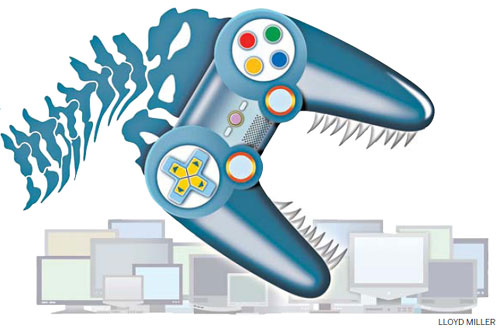Questions of relevance greet generation of consoles
Updated: 2013-09-22 07:55

REDMOND, Washington - In November, Microsoft will release its Xbox One and Sony its PlayStation 4 in the United States and Europe. They will join Nintendo's Wii U, out since last November, as the latest in a generational line of game consoles to arrive in the past quarter-century. To dedicated gamers, each generation is as relevant and real a part of the calendar as an Olympiad or a presidential election cycle.
But the previous generation has stretched on longer than those before it. Serious people discuss whether these new consoles, facing competition from cellphones and tablets, might be endangered. Untethered from a television, mobile devices - which draw hundreds of millions of people to distraction with Angry Birds, Clash of Clans and Temple Run - make gaming more convenient. The home console's appeal is dependent on the notion that gaming on a television still matters.
The industry is at the start of its eighth console generation. Generations typically last a half-decade and are preceded by the promise that the new, ever more powerful devices will improve the world's youngest major creative medium, make their manufacturers a lot of money and in some way reconfigure living rooms across the world.
The point of an Xbox is to "bring the things you love to life,"said Don Mattrick, Microsoft's chief of interactive entertainment. "You love entertainment. You love TV. You love games. This is going to be the premium experience for enjoying those things."
Mr. Mattrick's challenge, like that of his counterparts at Sony and Nintendo, is to convince people that the game console and its ubiquitous controllers aren't going the way of the landline telephone or, in a threat that hits closer to home, the arcade machine. Just a few decades ago the home console was an upstart. By the late 1990s it was unseating arcade machines, gobbling the public's attention the way Pac-Man used to gobble all those dots (and coins). Consoles like the Nintendo 64 and the Sony PlayStation brought the graphics and sounds of arcade-caliber gaming home and improved on them by offering richer, deeper worlds to play in.
The outgoing console generation started in 2005 with Microsoft's Xbox 360. Sony's PlayStation 3 followed a year later, as did Nintendo's Wii, with a motion-sensitive controller that turned it into a cultural phenomenon. In an age when iPhones are displaced every year, 2005-era console technology is nearly Paleolithic. It's a testament to the ability of programmers to squeeze performance out of established hardware.
Proponents of consoles argue that most mobile games, while increasing in appeal, lack key qualities of console gaming. "They're very bite-sized, very light on the story, very light on the emotions and the different things that a proper sit-down-on-your-couch-with-a-50-inch-screen-and-surround-sound experience can provide,"said Scott Rohde of Sony.
Microsoft's vision for the Xbox One extends beyond gaming. It is designed to switch from playing games to showing cable television with a snap of the fingers. Older consoles simply played games, but newer ones are designed to play television shows and movies.
That shift in focus has been gradual but definite at Microsoft, which added one of its most popular features to the Xbox 360, the ability to stream movies through Netflix, in 2008.
Mr. Mattrick also announced a deal with the National Football League that would empower the Xbox One to display an interactive fantasy league application on the right side of a TV while the left side displayed a live football game.
Mr. Rohde and Mr. Mattrick both suggest that better technology enables greater aesthetic achievement in their medium.
Mr. Rohde cited the PlayStation 3's forthcoming The Last of Us, a graphically complex survival adventure set in a nearly photorealistic ruined United States, as an example that requires a powerful console.
Mr. Rohde also pointed to economics, saying that the low prices of many mobile games (around $1) restrict development budgets to a fraction of those for lavish $60 console games.
The PlayStation 4 and the Xbox One will probably be up against new devices from Apple and other mobile competitors. Games are likely to be popular on all of those machines.
"What's so exciting about this particular time in the history of gaming is that it's more wild than it's ever been,"Mr. Rohde said. "No one on the planet knows quite where it's going to go."
The New York Times























